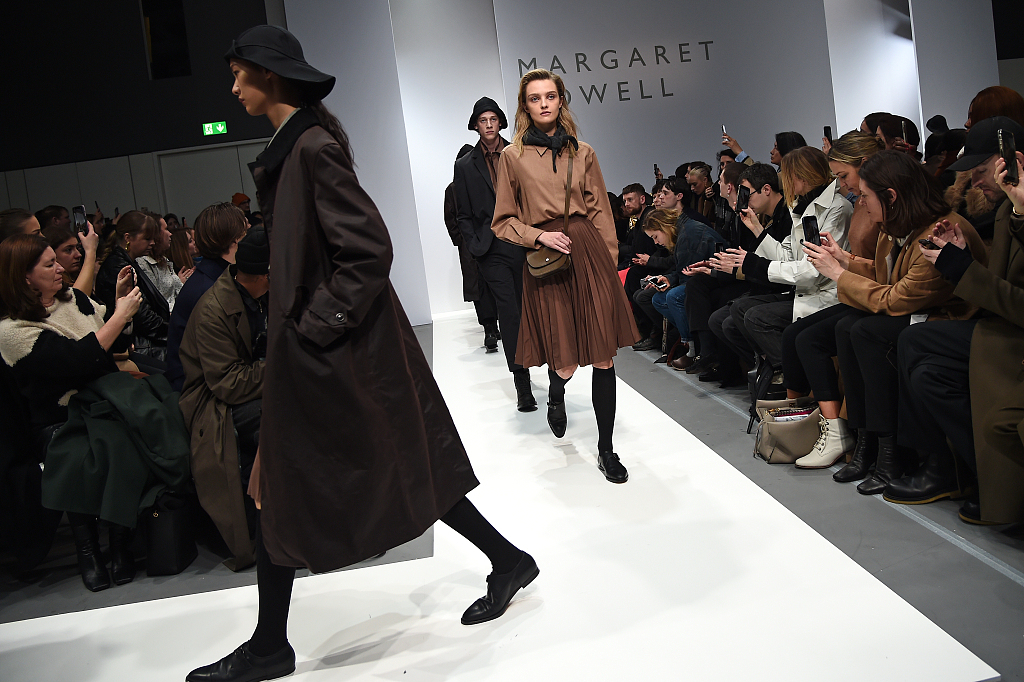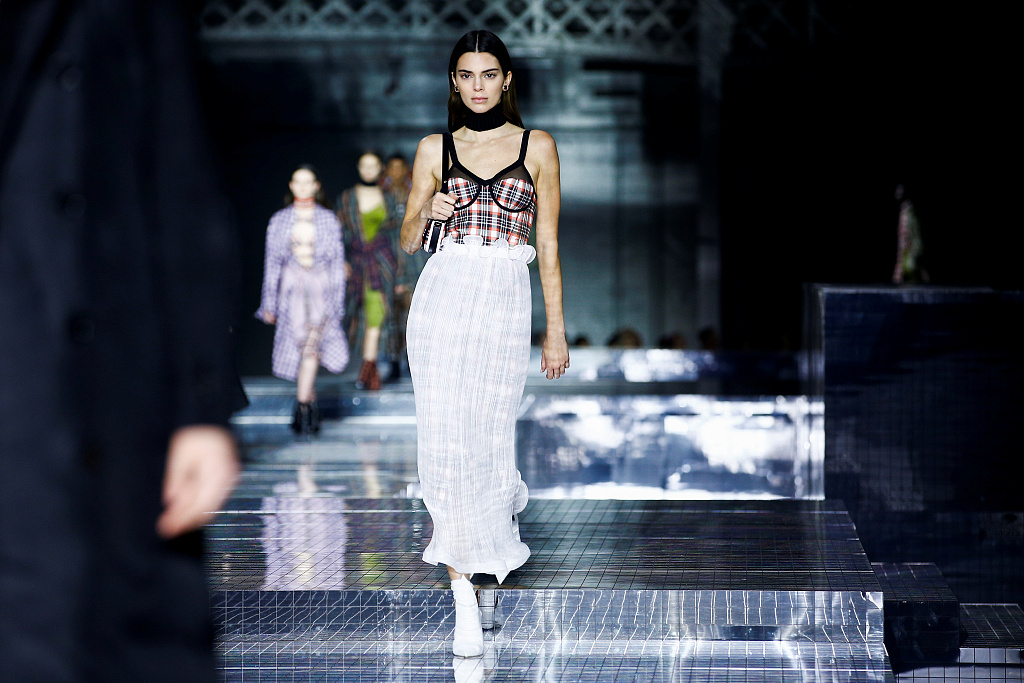London Fashion Week ended highlighting British style, sustainable collections, and Milan Fashion Week kicked off with big brands, but both felt pain over fewer Chinese in attendance.
London Fashion Week explores British style
At a moment of introspection for Britain after it left the European Union, designers turned to typically British materials.
Margaret Howell, who is celebrating her brand's 50th anniversary, stuck with a British look with a short trench coat worn with bare legs, pleated skirts and ties casually tied around blouses, in a schoolgirl chic style.

Models walk the runway during the finale at the Margaret Howell show during London Fashion Week, in London, Britain, February 16, 2020. /VCG
Models walk the runway during the finale at the Margaret Howell show during London Fashion Week, in London, Britain, February 16, 2020. /VCG
In Scottish tartan, the Shrimps models look ready for a weekend at Balmoral, Queen Elizabeth II's Scottish country retreat.
For Burberry, creative director Riccardo Tisci continues to revisit the trench coat that made the brand famous, rejuvenating it and making it sexier.
For his fourth season, he notably created trench coat-puffer jacket hybrids and daringly mixed different grid prints.
Environmental awareness
Designers can no longer ignore the industry's environmental impact – something campaigners Extinction Rebellion tried to remind them of on Saturday.
Through the use of renewable materials and "upcycling" – reusing used clothing materials – innovative stylists were featured in an exhibition on "positive fashion."
The big brands are also evolving. Burberry announced that its fashion show was certified neutral in terms of carbon emissions, while Tommy Hilfiger claims his spring 2020 collection is the most environmentally-friendly ever produced.

Model Kendall Jenner presents a creation during the Burberry show in London Fashion Week in London, Britain, February 17, 2020. /VCG
Model Kendall Jenner presents a creation during the Burberry show in London Fashion Week in London, Britain, February 17, 2020. /VCG
As a reflection of this changing industry, Ireland's Richard Malone, one of the most advanced young designers in terms of sustainable development, received the international Woolmark prize on Monday.
Meanwhile the first Karl Lagerfeld prize for innovation went to Emily Adams Bode of the United States, an "upcycling" star.
Fashion Weeks feel pain over fewer Chinese attendances
The involvement of Chinese retailers and media was sharply down at London Fashion Week due to European countries' travel restrictions imposed over the COVID-19 virus outbreak.
Similar situation happened to Milan Fashion Week kicked off Tuesday, with the absence of thousands of Chinese designers, buyers and journalists.
For five days, Italy's biggest fashion names such as Armani, Fendi, Prada, Versace and Gucci will showcase their Autumn-Winter 2020 Women's collections.
Amid the 56 shows, 96 presentations and some 40 events planned through Sunday in the hub of Italian fashion, the three Chinese designers with fashion shows scheduled – Angel Chen, Ricostru and Hui – pulled out.
The Chinese absence is not just around the catwalks but behind the scenes, in showrooms where international buyers come to order pieces that will end up a few months later in luxury boutiques around the world.
To make up for the gap, the chamber has launched an assortment of digital means to connect buyers in China by giving them access to the catwalks in streaming but also behind the scenes.
Interviews with designers and live shows in the heart of the showrooms will also be made available.
Prada has changed the time of its show on Thursday from 6:30 p.m. to 4 p.m. to better allow the Chinese market to follow the show.
China will also be in the spotlight with the Chinese-Italian Fashion Town initiative sponsored by the Chinese retail colossus Chic Group, giving eight emerging Chinese brands the opportunity to present their collections at the Hub dedicated to buyers.
The designers will be present virtually with video links.
China accounts for over a third of global luxury consumption. The National Chamber for Italian Fashion said the economic impact of the epidemic was "currently not calculable."
(With input from AFP)
(Cover image: A model walks the runway during the finale at the Shrimps show during London Fashion Week, in London , Britain, February 14, 2020. /VCG)